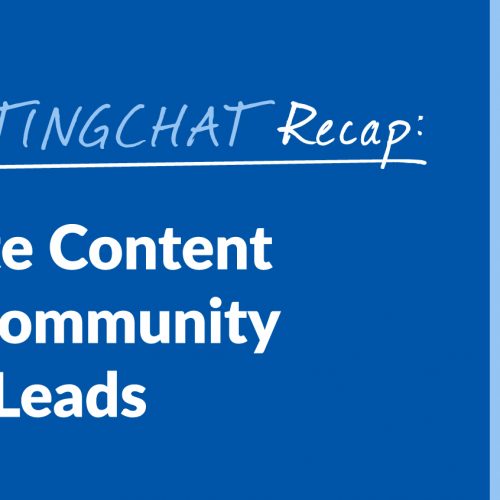#ContentWritingChat Recap: How to Create Content That Builds Community & Generates Leads with Kathleen Burns
Did you catch #ContentWritingChat this week? If not, there’s no need to worry! We have a recap of our latest chat and it’s filled with amazing tips to help you take your content to the next level. If you’re ready to learn how to create content that builds community and generates leads, keep reading! #ContentWritingChat Recap: How to Create Content That Builds Community & Generates Leads with Kathleen Burns Join us for #ContentWritingChat on Tuesday, January 31st at 10 AM CST with @katbu! pic.twitter.com/AnoEdAtpm2 — Express Writers (@ExpWriters) January 24, 2017 For this week’s chat, we were joined by Kathleen Burns. Kathleen is the Community Manager the United States Blog Editor for our friends over at SEMrush. She joined us to share her tips on creating content that not only builds community for your brand, but also helps you generate leads. Q1: How can you create content that appeals to your audience? What steps do you need to take? One key element in creating successful content for your brand is appealing directly to the people you’re trying to reach. Without creating the content that speaks directly to them, you’re going to wind up attracting all the wrong people or worse… No one at all! Here’s what you need to know about creating content your audience will love: A1a: Talk and listen! Learn questions/issues by reading reviews, forums, blog comments. Develop reader personas! #ContentWritingChat pic.twitter.com/XOhp0XjGw9 — Kathleen Burns (@katbu) January 31, 2017 A1b: Content must answer what’s in it for them. Talk about how you can address their pain points and get to it fast #ContentWritingChat pic.twitter.com/tzgmuzKIcc — Kathleen Burns (@katbu) January 31, 2017 As Kathleen said, the first step in creating content that appeals to your audience is talking to them and listening to what they have to say. You can learn so much about the questions they have and the issues they’re facing by just asking them. Reviews, posts on online forums, and comments on your blog are also great sources of feedback from your audience. She recommends creating a reader persona so you know exactly who you’re writing for. It always helps to address your audience’s key pain points. Not only will they appreciate it, but it’s the best way to provide tremendous value to them. They’ll want to keep coming back for more and more after that. A1 ? Listen to your audience first! Just like in a real life relationship, you can’t get to know someone w/o listening. #ContentWritingChat pic.twitter.com/6s5BpYdC0g — Julia McCoy ? (@JuliaEMcCoy) January 31, 2017 Julia agrees! Listening is key to getting to know your audience and understanding their needs. Treat it like a real life relationship and start making those connections through conversations and listening to what others have to say. A1 – Step one is always the same: Know your audience. I mean KNOW them. Know what they care about and motivates them #contentwritingchat — James Ellis (@thewarfortalent) January 31, 2017 James said step one is always to know your audience. Without truly knowing who you’re trying to reach with your content, you aren’t able to create the content that will speak to them. Get to know and understand your audience before you move forward with creating blog posts and social media content. A1a: Know your audience. What are they talking about, what have they liked of your content so far? #ContentWritingChat — Kristi Kenyon (@kkenyon86) January 31, 2017 Kristi agrees that knowing your audience is the first step to content creation. She suggests determining what they’re talking about, but also what they have liked of your content so far. For example, see what your most popular blog posts are because it’s likely a good indicator that your audience would love to see more content that’s similar. A1 Understand your audience, first and foremost. If you’re not learning their preferences and pain points, it’s like… #contentwritingchat pic.twitter.com/NJHZ5r6w22 — Bill Skowronski (@BillSkowronski) January 31, 2017 Bill’s advice is to learn the preferences of your audience as well as their pain points. When you know they’re preferences, you can determine what content formats they like the most and which topics are their favorites. Understanding their pain points gives you the opportunity to solve their biggest struggles. A1 Understand your audience. That means get out and talk to them. Ask what they need, where they struggle and then serve #ContentWritingChat pic.twitter.com/uh6AScoVuj — Cassandra Schwartz ⭐ (@MWestMillennial) January 31, 2017 Cassandra’s advice is spot on. If you want to get to know your audience, it helps to get out and actually talk to them. Strike up a conversation in your blog’s comments, on social media, or within your email newsletter. The options are endless. Figure out what they need and what they’re struggling with and then deliver exactly what they need. @ExpWriters A1: Understand their problems, desires, or wants. Know what they are looking for and answer how you can provide it #ContentWritingChat pic.twitter.com/N2JMRjS5QA — Jacob Rouser (@J_Rouser) January 31, 2017 As Jacob said, you want to understand the problems, desires, and wants of your audience. Once you have that figured out, you can create the content they need the most. Q2: Why is it important to set goals for your content? Discuss goals to set for community building and lead generation. The content you create should always serve a purpose, whether it’s a blog post, a video, a podcast, or something else. In order to determine if you achieved what you set out to do, you need to set goals that you can actually measure and track. Here’s what some of the participants in Tuesday’s chat said about setting content goals: A2: Content goals provide direction and depth for content dev. Make it measurable. Define success. Align to biz goals #ContentWritingChat pic.twitter.com/7jWZA2j0CS — Kathleen Burns (@katbu) January 31, 2017 Kathleen said content goals provide direction and depth for content development. Here advice is to make your goals something measurable and define what a successful piece of content means for you. That could be … Read more



